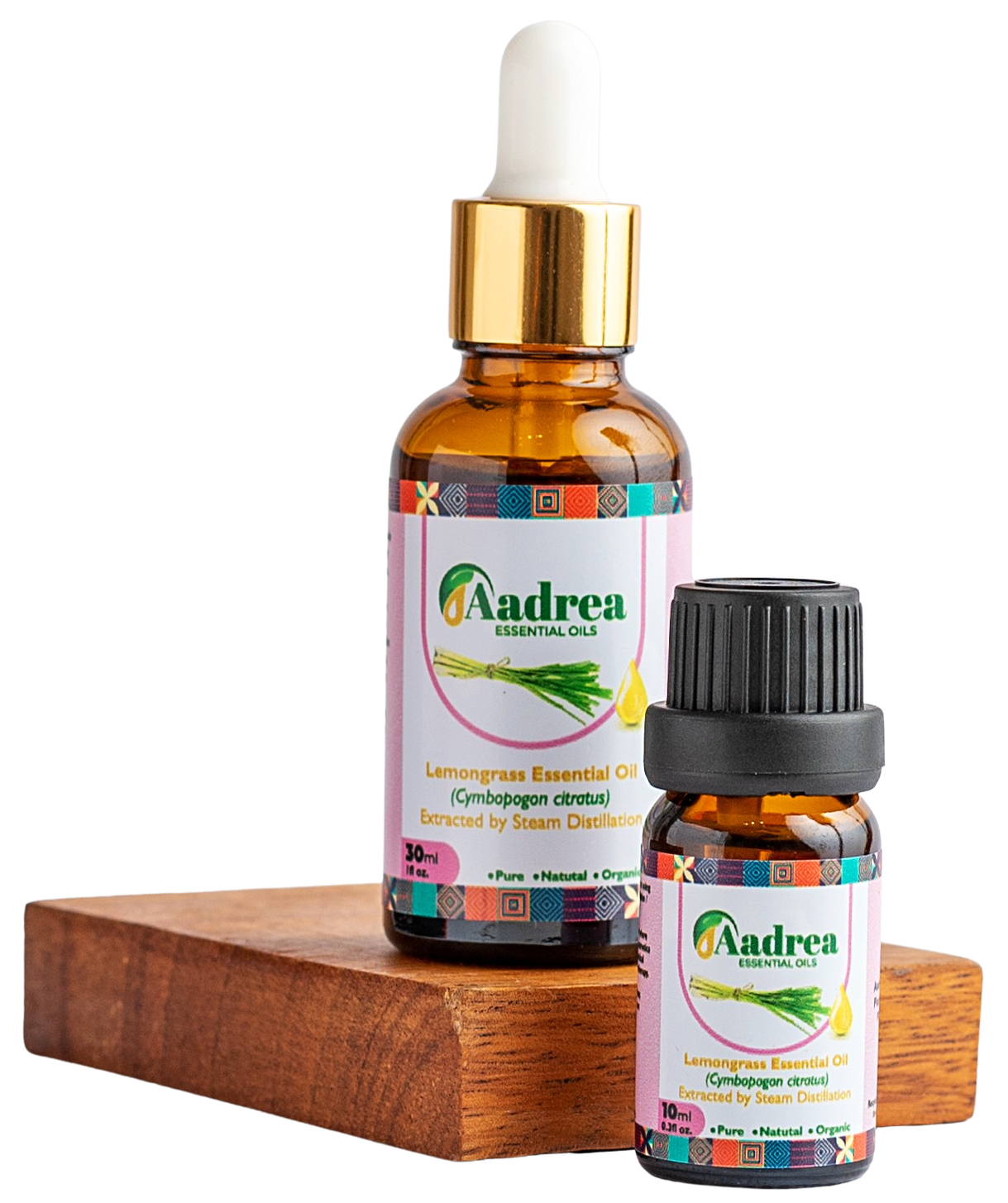Lemongrass essential oil
Aadrea Lemongrass essential oil is extracted/derived from the stock of Cymbopogon citratus, a specie of grass in the Poaceae family of grasses, native to the Tropics.
The grass is one of the more frequently used beverage flavorants in local tea preparations, juices and meals.
Identification:
Lemongrass essential oil is a pale yellow to orange yellow mobile liquid. Its scent is lemony, and characteristic with a hint of citral.
The main active component(s) in a typical oil sample are: Myrcene (16%), Citral (1%), Citronellal (2%), Geranyl Acetate (1%), Nerol (35%), Geraniol (40%), and Limonene (0.5%).

 Indications (benefits from use of product):
Indications (benefits from use of product):
Lemongrass essential oil is a herbal extract / product. It possesses analgesic, anti-microbial, anti-pyretic, anti-septic, astringent, bactericidal, carminative, deodorant, sedative, tonic, nervine and diuretic, properties.
Myrcene is a popular flavouring and aroma agent (food additive) used in the manufacture of food and beverages; it also has several reported biological properties—anxiolytic, antioxidant, anti-ageing, anti-inflammatory, analgesic properties.
Citral is also thought to have potent anticancer abilities against some cancer cell lines. This occurs either by causing cell death directly or boosting your immune system so that your body is better able to fight-off cancer on its own.
Citronellal is beneficial in suppressing fungal infections as well as for anti-inflammatory and antioxidant purposes.
Geranyl Acetate has good analgesic and anti-inflammatory properties, affecting how the brain perceives pain signals.
Nerol, like many other aldehyde terpenes, is naturally antibacterial, antiviral, and antifungal. It also promotes a gentle sedative effect and offers some minor pain relief.
Geraniol acts as an effective antimicrobial and antibacterial agent. Geraniol may have antioxidant, antitumor, and anticancer properties. Studies have shown that geraniol can fight inflammatory responses in the body. It smells great!
Limonene is beneficial for its anti-inflammatory, antioxidant, anti-stress, and possibly disease-preventing properties. It has been found to have strong anti-cancer properties in clinical trials.
How to Use:
Hair Health: Lemongrass essential oil can strengthen your hair follicles, so if you are struggling with hair loss or an itchy and irritated scalp, massage a few drops of diluted lemongrass oil (5-10 drops in carrier oil) into your scalp for two minutes and then rinse. The soothing and bacteria-killing properties will leave your hair shiny, fresh and odour-free.
Inhalation: The oil is beneficial to relieve stress and anxiety. Add 2-3 drops in handkerchief, place over nose and inhale.
Using a Diffuser/Humidifier: Apply 3-6 drops in diffuser of choice with clean water to generate the vapour.
Aromatherapy: Lemongrass essential oil is used in aromatherapy, to relieve stress and anxiety, and a muscle relaxer. A carrier oil of choice should be selected before the dilution is done. Carrier oils are vegetable oils which reduce help the oil get into the skin, reducing the concentration without reducing potency. For every 5-10 drops of Lemongrass essential oil, use at least 10ml of carrier oil (Olive Oil, Coconut Oil, Jojoba Oil are excellent local options of carrier oils). Blend with carrier oil of choice prior to massage to minimize any skin sensitivity.
Bug Repellent: Owing to its Citral and Geraniol content, lemongrass essential oil is known to repel bugs such as mosquitoes and ants. This natural repellent has a mild smell and can be sprayed directly on the skin. You can even use lemongrass oil to kill fleas; add about five drops of oil to water and create your own spray, then apply the spray to targeted areas, and your pet’s coat.
Cosmetic use: In manufacturing, lemongrass essential oil can be used as a fragrance in hand sanitisers, soaps and cosmetics. Lemongrass oil mouthwash 2% concentration has showed strong antioxidant abilities and is a potential complementary therapy for nonsurgical dental procedures and gingivitis. Lemongrass is also used in making vitamin A and natural citral. Furthermore, as an air cleanser, Lemongrass oil is beneficial in perfumes and odorizers.
Compresses: Hot compresses are very useful for the relief of rheumatic and muscular aches and pain, relief of headaches, relief of menstrual cramping and for drawing out boils. Alternating warm and cold compresses may be used to help speed healing in pulled muscles, sprained ligaments and bruises. Use 5 drops of essential oil in 200ml of water. Place a cloth, un-medicated gauze or cotton wool into the water, wring out and then cover the area being treated. Place a plastic wrap around the compress and then a towel or blanket on top. Leave the compress on for several hours.
Menstrual Cramp Relief: Drinking lemongrass tea is known to help women with menstrual cramps; it can also help with nausea and irritability. Add 1-2 drops of pure Lemongrass oil to each teacup; drink one to two cups of lemongrass tea a day to relieve pain associated with your period. There’s no scientific research on this use, but lemongrass is known to be soothing internally and stress reducing, so it makes sense why it may help with painful cramps.
Citations and References:
- https://www.rxlist.com/lemongrass/supplements.htm
- Volker Schulz Rudolf Hansel Varro E. Tyler (1998): Rational Phyto therapy
Before Use:
The undiluted oil is unsafe to ingest orally in large quantities (more than 1-2 drops).
To minimize the risk of skin irritation, a person should avoid applying lemongrass essential oil to the skin if they have allergies or skin conditions, such as eczema; they have not diluted the oil first, and if they have broken or damaged skin.
Use less than the recommended dilution when making massage oil blends for children and people with sensitive skin. Use only a 1% dilution, i.e. 2 drops to every 10 ml of carrier oil.
Pregnant and nursing women are particularly cautioned to seek medical guidance.
 Side effects and management in event of misuse/ingestion:
Side effects and management in event of misuse/ingestion:
Toxic side effects after inhaling lemongrass essential oil, such as lung problems are rare, but possible especially where there has been lengthy use of a diffuser.
Side effects for sensitive skin may include a rash, discomfort or even a burning sensation. Perform a patch test first to make sure you have no irritations and dilute the essential oil with a carrier oil.
Additional information:
Aadrea Lemongrass essential oil is packaged in durable aluminum cans or labelled amber bottles with a dropper. Alternative packaging and seals will be specified as they become available.
Essential oils are volatile and lose their potency when exposed for long periods to oxygen and direct sunlight. Store the oil in its original sealed container, in a cool and dark space.
Our essential oils, oleoresins, absolutes and hydrosols have been made using an ideal and chemical neutral /free process of either steam distillation, cold press and supercritical extraction. The purity of the oils has been ensured by keeping the amount of hydration/water content and other elements at the lowest level. With this in mind, we are confident that the product will remain effective if you store it in its primary bottle/container, away from direct sunlight, excessive heat and minimize the periods the bottle is opened (during which the oil potentially gets exposed to oxygen).
Your essential oil should remain viable (with the full optimal potential to deliver the intended benefit) for an average of 36 months (3 years)*** from the date of its manufacture.
